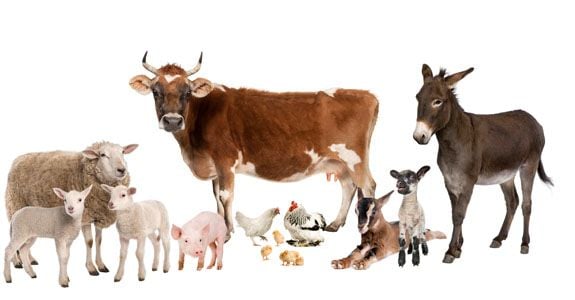Using antibiotics incorrectly may harm, rather than help, your pet.
Read more

Have you ever dreamed of one day owning a farm? Well, owning some livestock can give you the same rewarding feeling. Livestock consists of animals such as cows, pigs, sheep, goats, donkeys, horses, and mules. Whether you want an animal to provide you with fresh eggs in the morning or one to ride through your pasture, livestock animals are your best bet to give you what you are looking for.
Choosing what livestock to raise relies heavily on how much space you have, if they need fencing, how much they eat, state and local property laws, and more. You should also consider what type of veterinary care your livestock will require to avoid the spread of diseases and external parasites. Your veterinarian can recommend the best vaccinations for your livestock so they stay as healthy as possible. Continue to the articles below to learn how you should care for each livestock animal.
-
What You Need to Know About Antibiotics
-
Training Tips for Your Pets
-
World Rabies Day
-
Why A Vet Is Your Best Defense During A Zombie Apocalypse
-
8 Common Reasons Why Your Dog is Snoring
-
Becoming a Service Dog: Training and Temperament Are Key Factors
Service dogs help thousands of disabled Americans become more independent. The first service dogs guided visually impaired people, but today, the dogs assist people who have a variety of disabilities, ranging from hearing loss to seizures to cerebral palsy. Before a dog can become a service animal, it
Read more -
How to Make Vet Visits a More Pleasant Experience for Your Pet
-
Should Your Dog Wear a Backpack?
Thinking about buying a backpack for your dog? Consider these factors before you visit the pet store.
Read more -
Secondhand Smoke Affects Pets Too
The effects of secondhand smoke on people are well-documented. Exposure to tobacco smoke causes a variety of serious health problems, including stroke, heart disease, and lung cancer, according to the Centers for Disease Control and Prevention. Not surprisingly, secondhand smoke also increases the risk
Read more -
Identifying Dementia in Senior Dogs
-
Could Those Sniffles Be a Symptom of the Feline Flu?
-
How to Help Your Cat Get More Exercise
When's the last time your cat worked out? Daily exercise can help keep your furry friend healthy.
Read more -
9 Reasons Your Cat May Be Losing Weight
Does your cat look thinner than usual? One of these nine reasons may explain why your cat is losing weight.
Read more -
The Canine Genome and DNA Testing
Have you ever looked at your adopted dog with its short legs, shaggy hair and brown spot encircling one eye, and wondered what dog breeds are in there? Now that science has decoded the DNA of dogs, science can tell us many things. Harvard and MIT programs unraveled the canine DNA sequence in 2006, which
Read more -
What to Do If Your Pet Eats Grass
-
Euthanasia: Saying Goodbye
It's not easy to say goodbye to cherished pets, even those that have lived long, happy lives. Although you may hate the thought of life without your pet, euthanasia can be the kindest decision you can make when your friend is suffering. Making the Decision If your pet has been seriously injured in a
Read more
